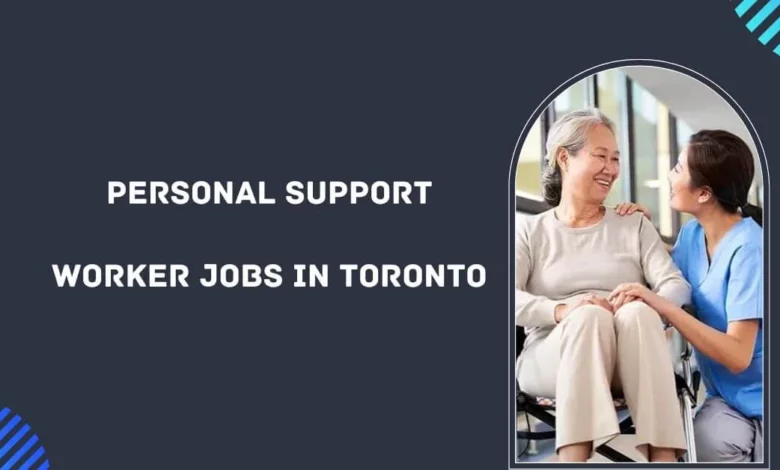Personal Support Worker Jobs in Toronto 2024 – Apply Now

LOFT Community Services, an innovative and ever-evolving philanthropic entity, assists individuals grappling with multifaceted challenges, including but not limited to mental and physical health disorders, substance abuse problems, homelessness, and poverty. LOFT, which last year provided 1,788 units of supportive housing and serves approximately 13,969 individuals annually, is one of the leading providers of mental health services in Ontario.
Additionally, LOFT has been honored with the prestigious Nonprofit Employer of ChoiceTM Award (NEOC). In support of its mission fulfillment, LOFT is in search of a personal support worker.
Check Also: Live-in Caregiver Jobs in Canada with Work Permit 2024
Details of Personal Support Worker Jobs in Toronto
- Location: Toronto, ON (MHJI/ Sherburne High Support)
- COMPENSATION: $23.44/hour
- Company: LOFT Community Services
Summary of Personal Support Worker Jobs
The role of the personal support worker entails providing a variety of services to the program’s customers by its fundamental principles and objectives. As assigned, the personal support worker will assist to vulnerable, at-risk, senior citizens, and older individuals residing in the program’s multiple sites. The clients’ physical, cognitive, mental, and social/recreational requirements are addressed by this assistance.
The employee will ensure compliance with the program’s established procedures, which include all security, fire, and general health and safety measures. These and additional delegated duties will be carried out by the personal support worker to guarantee the high standard of personal care provided to the program’s clients.
Benefits of Personal Support Worker Jobs in Toronto
- Extreme Demand: A substantial employment landscape emerges in Toronto as a result of the elderly population and the consequent demand for care services, which generates considerable demand for PSWs.
- Maintaining Job Stability: Positions as PSWs provide employment security and stability, particularly in healthcare facilities, home care environments, and assisted living facilities, due to the increasing demand for healthcare services.
- Satisfying Work: By providing direct care and assistance to those in need, PSWs can significantly improve their lives, an experience that can evoke emotional fulfillment.
- Flexible Places of Employment: Professional social workers (PSWs) are permitted to operate in a variety of contexts, such as private homes, hospitals, long-term care facilities, and community health agencies, which provides them with the opportunity to experience diverse work environments that cater to their individual preferences.
- Professional Development: Career advancement prospects exist within the healthcare industry for PSWs who engage in advanced education or concentrate on particular domains of care.
- Compensatory Competitiveness: In Toronto, PSWs frequently receive benefits including paid time off and healthcare coverage, in addition to competitive compensation, particularly in healthcare organizations and institutions.
- Development of Professionalism and Training: PSWs have access to a multitude of training programs and opportunities to advance their careers, such as seminars, certifications, and continuing education.
- Support for Community Health: Supporting individuals with healthcare requirements is a critical responsibility of PSWs, which contributes to the health and well-being of the community as a whole.
- Adjustment in Scheduling: Certain positions of PSW provide individuals with the opportunity to manage work alongside personal obligations or academic pursuits through the use of flexible work schedules.
- Job Diversity: The interactions with diverse patients or clients that comprise the PSW profession provide opportunities to learn and adapt to various care preferences and requirements.
What you will do:
- assistance with the mental and physical health needs of clients.
- Develop a professional relationship with clients that promotes the maintenance of their dignity, facilitates the resolution of their psychosocial, behavior management, and medical concerns, and fosters personal empowerment.
- Assist clients in remembering to take their medications at the prescribed times and in strict adherence to the instructions provided by their physicians.
- Maintain adherence to the medication system procedures established by the residence or program. This includes tasks such as ordering, recording, and reminding clients to administer their medications, in addition to facilitating the self-medication program.
- Supervise and assist clients afflicted with medical issues and ailments, which may involve cleansing areas that demand urgent attention (e.g., floor coverings, textiles), to ensure the client’s comfort and support. In addition, maintain a record of ailments and their corresponding circumstances, and coordinate medical and emergency provisions with the program director and senior PSW.
- Promote and support clients in the execution of the subsequent activities of daily living: a. Ironing and laundering personal garments Community Services LOFT Dressing and undressing clients while ensuring they are appropriately attired
- Assisting clients with activities of daily living such as bathing, personal hygiene (including shaving, shaving, and shaving), ambulation, toileting, and transferring during meals, meal preparation, serving, feeding, food cutting, and purchasing for incontinent clients
- Assist clients with activities of daily living, including but not limited to bed making, dusting, scrubbing, and maintaining a tidy living space, to foster the adoption of a more conventional way of life.
- Assist individuals in coping with challenges and difficulties that stem from cognitive impairments.
- Offer social support through activities such as conversing, composing letters, making phone calls, and fostering interest in hobbies and other recreational pursuits.
- Attend medical appointments, visit friends, and attend to other social interaction requirements that have been identified in the community.
- It is imperative to uphold precise and up-to-date documentation of care service provision and track individual clients’ behaviors in adherence to established protocols.
- Engage in consistent attendance at meetings arranged with clients and/or fellow staff members to deliberate on the formulation of support objectives for specific clients. Adhere to the established objectives and duties.
- General health and safety, fire protection, and maintenance and security
- Immediately contact the appropriate emergency services in the event of an emergency. Furthermore, ensure that all incidents are documented using the proper forms. Initiation of communication with the program director or a designated individual will adhere to the policies and procedures of the residence or program.
- As required, interact with consumers throughout the designated shift. Additionally, daily formal contact will be maintained to ensure the safety and convenience of the client.
- Document and follow up on the absence of a client per program procedures.
- Ensure that personal support apparatus and supplies are easily accessible. Keep up-to-date with the program director and maintenance regarding any damage or repair requirements.
Specific Medical Responsibilities
- Oversee the medication regimen in collaboration with the attending physician, pharmaceutical consultant, and other LOFT Community Services personnel. Descriptive Job Personal Support Workers and the Program Director should be consulted concerning any system-related issues.
- Ensure the appropriate storage and documentation of pharmacy medications, in collaboration with the pharmacist and physicians.
Social/ Recreational Activities
- As required, attend program coordination meetings and contribute to activity planning.
- Maintain precise participant records for the program.
- Notify the appropriate personnel when a client is absent for meals or medications due to special excursions.
- Ensure that the necessary supplies and equipment are readily available and operational. Equipment damage and maintenance requirements should be communicated to the Senior PSW and Program Director.
- Participate actively in every program activity that is scheduled.
- In addition to driving the van to convey clients on outings, assume leadership of the activity. As necessary.
- Additional duties as assigned by the program director or services coordinator
What You Bring
Must Haves
- A comprehension of the principles underlying harm reduction and psychosocial rehabilitation
- Equivalent to a degree or diploma in human services,
- A minimum of two years of experience in client population management
- Understanding of the challenges encountered by adults who are marginalized and have special needs, including but not limited to addictions, cognitive impairments, and HIV/AIDS
- comprehend the therapeutic alliance and possess the capacity to negotiate with clients regarding their objectives and priorities.
- Proficiency in collaborating with fellow professionals as well as organizing and facilitating group discussions and meetings
- Proficient interpersonal, communication, and counseling abilities are essential for teamwork and engaging clients in highly personal matters, including the promotion of healthy lifestyle choices, life skills, and the maintenance of interpersonal connections.
- Proficient crisis intervention and problem-solving abilities are essential.
- Proficiency in computer operations is required to create and manage files, records, and statistical data.
- The use of written skills is required for recordkeeping and journal updating.
- Possessing strong analytic, time management, and organizational abilities to assist with program planning, as well as to coordinate and follow up with customers on issues or activities
Nice-to-Haves
- Cultural Competence and anti-oppression Framework Comprehension
- significant assets, reflective of the multi-barrier group that the program serves.
We hold the belief that skill development can occur in a multitude of ways, and we are avid enthusiasts of varied experiences! We therefore encourage you to apply, even if you do not “check all the boxes,” but believe you would flourish in this position.
Please be advised that COVID-19 vaccination is a mandatory requirement for all LOFT employees (by LOFT’s Vaccination Policy) at the time of employment unless they hold non-client-facing positions or consistently collaborate with staff who do.
For More Info:
Email Your CV, and We’ll Find the Best Pathway For you: info@caregiverjobswithvisa.com
Frequently Asked Questions:
-
How much does a PSW get paid in Toronto?
The average hourly pay for a Psw in Ontario is $28.00 an hour. While ZipRecruiter is seeing salaries as high as $76.20 and as low as $12.74, the majority of Psw salaries currently range between $15.14 (25th percentile) and $24.04 (75th percentile) in Ontario.
-
How do I become a PSW in Toronto?
To become a PSW, you’ll need a college certificate in personal support work (or health care assistant in Western and Maritime provinces). These certificates typically take 8–12 months to complete, but colleges in Ontario have introduced an accelerated PSW training program that only lasts 6 months!
-
Is PSW a good career in Canada?
The demand for PSWs in Canada today makes your PSW training worth it. Currently, more PSWs are retiring than those who are just beginning their careers in Canada, and a shortage in PSWs is expected until at least 2020. As a result, those in a PSW course can anticipate a career that is in high demand.



